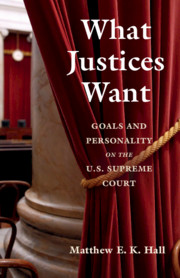Book contents
- Frontmatter
- Dedication
- Contents
- List of Figures
- List of Tables
- Acknowledgments
- 1 Who They Are and What They Want
- 2 Goals and Personality
- 3 Measuring Justice Personality
- 4 Agenda Setting
- 5 Opinion Assignments
- 6 Intra-Court Bargaining
- 7 Voting on the Merits
- 8 Separate Opinions
- 9 Behind the Black Robes
- Appendix A Agenda-Setting Analysis
- Appendix B Opinion Assignment Analysis
- Appendix C Intra-Court Bargaining Analysis
- Appendix D Voting on the Merits Analysis
- Appendix E Separate Opinion Analysis
- Notes
- Index
Appendix B - Opinion Assignment Analysis
Published online by Cambridge University Press: 22 August 2018
- Frontmatter
- Dedication
- Contents
- List of Figures
- List of Tables
- Acknowledgments
- 1 Who They Are and What They Want
- 2 Goals and Personality
- 3 Measuring Justice Personality
- 4 Agenda Setting
- 5 Opinion Assignments
- 6 Intra-Court Bargaining
- 7 Voting on the Merits
- 8 Separate Opinions
- 9 Behind the Black Robes
- Appendix A Agenda-Setting Analysis
- Appendix B Opinion Assignment Analysis
- Appendix C Intra-Court Bargaining Analysis
- Appendix D Voting on the Merits Analysis
- Appendix E Separate Opinion Analysis
- Notes
- Index
Summary
Table B.1 reports the results of the opinion assignment models. The data consist of majority opinion assignments to 34 justices during the 1946 through 2015 terms. Unless noted otherwise, the data were obtained from the Supreme Court Database. The dependent variable indicates whether each justice was assigned to write the majority opinion in each case (1 = assigned; 0 = not assigned). I conduct two separate analyses: one for the 5,844 cases in which the chief justice assigned the majority opinion (N = 41, 598) and one for the 1,093 cases in which the senior associate justice (SAJ) assigned the majority opinion (N = 6, 112). Modeling opinion assignments is especially complex because “the likelihood that a chief will assign the opinion to one justice is dependent on the probability that the chief justice will assign it to another member of the majority.” Because my models include an interaction term with an assignment specific variable (winning margin), I follow Maltzman and Wahlbeck by utilizing a random effects estimator for case. Therefore, I employ multilevel logistic regression models with random intercepts for case. However, my results are also robust to including random intercepts for justice. Both models include the justices’ SCIPEs for the Big Five (Extraversion, Conscientiousness, Agreeableness, Neuroticism and Openness), as well as the following control variables:
• The Winning Margin, which was calculated by subtracting the number of votes needed to form a winning coalition from the number of justices voting with the assignor (e.g., when all nine justices participate, the winning margin is zero if the majority has five justices and four if the decision is unanimous), as well as an interaction term between Winning Margin and Agreeableness.
• The number of majority opinions written by each justice on the same legal issue in prior terms (Issue Experience).
• A dichotomous indicator taking on the value one for justices in their first term on the Court and zero otherwise (Freshman Justice).
• The absolute difference in Segal–Cover ideology scores between each justice and the majority opinion assigner, whether the chief justice or the SAJ (Distance to Assigner).
- Type
- Chapter
- Information
- What Justices WantGoals and Personality on the U.S. Supreme Court, pp. 157 - 160Publisher: Cambridge University PressPrint publication year: 2018



